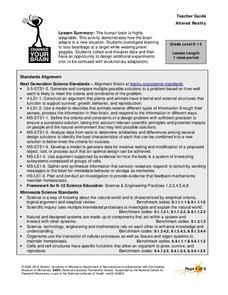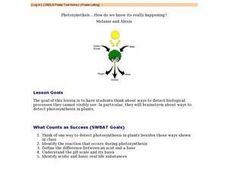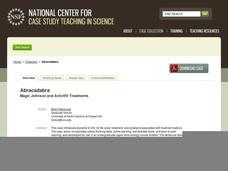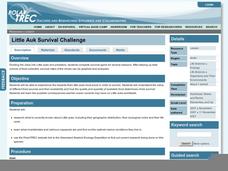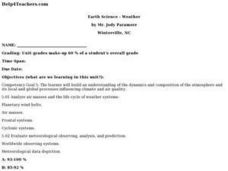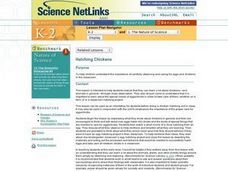University of Minnesota
Altered Reality
Fascinate young life scientists by showing them how their brain learns. By using prism goggles while attempting to toss bean bags at a target, lab partners change their outlook on the world around them, producing amusing results....
Curated OER
Photosynethsis....How do we know it's really happening? - Biology Teaching Thesis
Students think of one way to detect photosynthesis in plants besides those ways shown in class. They identify the reaction that occurs during photosynthesis. Students define the difference between an acid and a base. They identify acidic...
National Center for Case Study Teaching in Science
Abracadabra
How has Magic Johnson managed to stay so healthy, despite being HIV-positive for over 20 years? If you have ever taught about HIV and AIDS, you have most likely been asked such a question. By examining a case study and role-playing as...
Curated OER
Little Auk Survival Challenge
A bird's life is one of danger and intrigue as it struggles for survival in sometimes harsh environments. To understand how difficult surviving in the wild can be, children play a simulation game where they act as little auks, birds from...
Kenan Fellows
Ready, Set, Save on Solar Energy Technology!
Does your class have a bright future in the solar energy industry? Science scholars take an in-depth look at what's new in solar technology. After completing research into the solar industry, participants create and market a product in...
Agriculture in the Classroom
Growing a Nation (1950-1969): Prosperity & Challenges: The Story of American Agriculture
A wonderful lesson plan on the development and impact of mechanized farming! History or agriculture classes learn the historical background of the United States' food production by creating a pamphlet with information on the cause and...
Cornell University
Fibers, Dyes, and the Environment
Nanofibers can be made through electrospinning or force spinning in order to reduce the negative impact on the environment. Pupils study the role of fibers and dye on the environment through a series of five hands-on activities. Then,...
Curated OER
Sustainability and Extinction
Galapagos Penguins are the only penguins on earth that live north of the equator (in the wild). In this last lesson plan a discussion on how the Galapagos islands developed their populations and diversity sparks the introduction. Two...
Curated OER
Biological Succession in a Microecosystem
High schoolers investigate the concept of biological succession by simulating the process in a microenvironment with various microorganisms. By engaging in a lab, students determine the factors causing succession and learn population...
Curated OER
Earth Science - Weather
Students build an understanding of the dynamics and composition of the atmosphere and its local and global processes influencing climate and air quality. They analyze air masses and the life cycle of weather systems.
Curated OER
Succession in the Classroom
Learners investigate their environment by growing plants in class. In this botany lesson, students discuss the lifespan of plants and animals and how they must be cared for continuously over time. Learners grow a plant in class and...
Curated OER
Diversity of Life
Students study Arthropods and their characteristics. In this organisms lesson students explore the success of Arthropods and answer questions.
Curated OER
Space Science: Star Scramble
Students play a matching and sequencing game to discover facts about star life cycles. In small groups, they attempt to match their star stage and stage description cards in chronological order. Students can also research the terms and...
Curated OER
My Life 24-7
Analyze the "My Life 24-7" project as a part of community involvement. Students discuss the pros and cons of being community involved. They will also write a proposal to increase community involvement and submit a blog entry about the...
Curated OER
Speedy Succession
Fifth graders investigate how a pond ecosystem can change into a prairie or grassland ecosystem. They observe a small pond ecosystem in a two liter soda bottle, and examine and record changes over a two-week period of time on a worksheet.
Curated OER
What Does it Take to be a Survivor? Part One
Students explore marine animal adaptation. In this introductory ocean life biology instructional activity, students access prior knowledge by participating in a whole class "thought swap." Students form two lines, respond to a prompt...
Curated OER
Hatching Chickens
Students observe and care for eggs and chickens. In this life cycles activity, students recall facts about chickens and how they hatch. Students read the article Hatching Eggs in the Classroom and observe the life cycle of the chicken in...
Curated OER
Water: Our Most Important Beverage
Third graders create a KWL chart about water. In this environmental science lesson, 3rd graders demonstrate how much water on Earth is usable. They act out the different stages of the water cycle.
Curated OER
Science NetLinks: Fossils and Geologic Time
Young scholars investigate the development of the geologic time scale. Also, to introduce them to the major time periods in earth's history, as well as to the role fossils play in helping us understand this history.
NOAA
Seamounts
How do chains of islands form? Young oceanographers explore the mountains of the deep in the final installment in a 13-part series. The interactive compares types of seamounts based on their overall height and height under the water, as...
Curated OER
How Organisms Live Successfully in Their Environments
Middle schoolers compare the climate and organisms found in different environments, then give examples of how plants and animals adapt to their environment. They design an animal who adapts using camouflage to a made-up environment.
Curated OER
See Turtles Nest! See Turtles Hatch!
Students graph data of sea turtles hatching rates from Watamu/Malindi Marine National Park and Reserve in Kenya. In this math lesson, students use real life science data to calculate mean and median values. Students use the data to...
Curated OER
Classroom Science Fair Project
Students explore the skills and information needed to complete a science fair project. They follow guidelines to create an document their science fair project.
Curated OER
Community Distribution
In this community distribution worksheet, students will review 5 terms associated with biomes, ecosystems, and communities. Students will then match 11 terms as either relating to marine biomes or land biomes. This worksheet has 5 fill...


